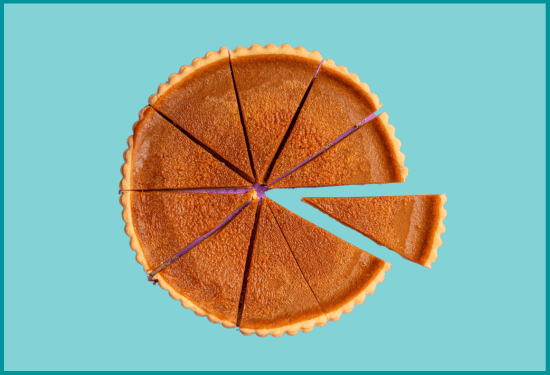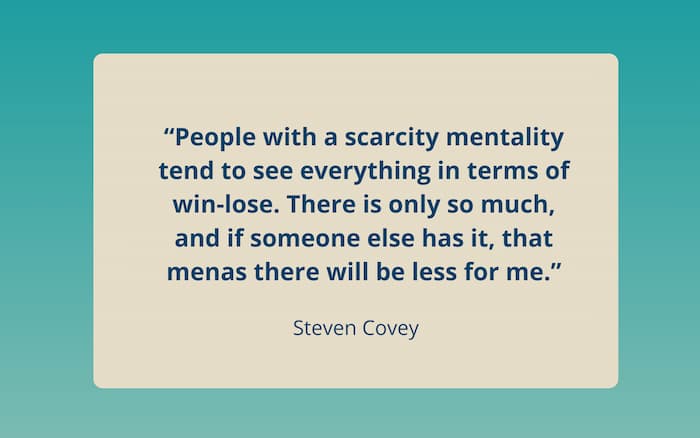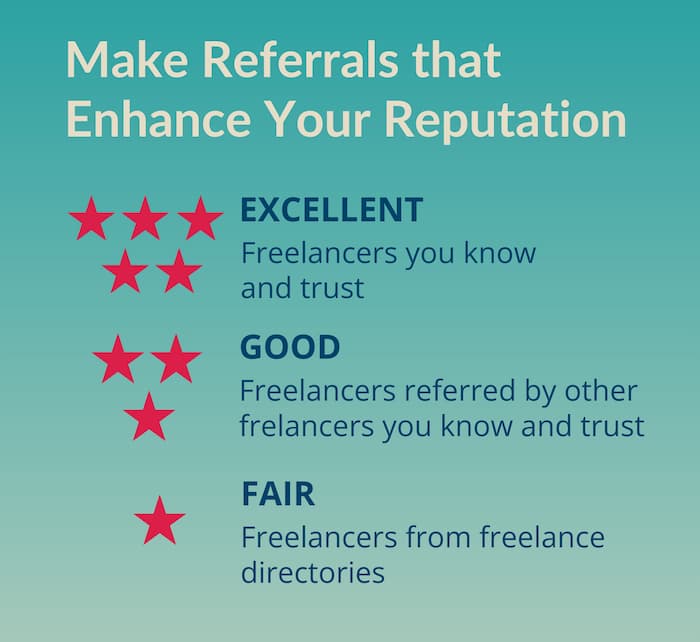Are You Greedy or Generous with Your Freelance Pie (Work)?
 Having an abundance mindset helps freelancers succeed—because there is plenty of freelance pie for everyone—and collaboration always beats competition.
Having an abundance mindset helps freelancers succeed—because there is plenty of freelance pie for everyone—and collaboration always beats competition.
If you help other freelancers, will there be less freelance pie—clients and work—for you? Some freelancers think so. Steven Covey, author of The 7 Habits of Highly Effective People, calls this kind of thinking the scarcity mentality (or mindset).

Why Eating All of Your Freelance Pie Makes Sense
Fear of losing out by helping other freelancers is understandable. It’s hard to get great clients and build a stable, successful freelance business. So you probably don’t want to give away clients and freelance work—even if you can’t take them yourself.
And since the rewards of helping other freelancers aren’t immediate, you may not see much point in making time to do this now. There are too many other things that you have to do today to worry about what might happen tomorrow.
Why Collaboration Beats Competition
Covey also coined the idea of the abundance mindset: The belief that opportunities are abundant, and can be shared them with others. People with an abundance mindset believe that the success of others “adds to…rather than detracts from…our lives,” says Covey. The abundance mindset is part of Habit #4: Think win-win, which focuses on collaboration and long-term results.
Having an abundance mindset helps freelancers succeed—because there is plenty of freelance pie for everyone—and collaboration always beats competition.
How Sharing Your Freelance Pie Leads to Success
John C. Maxwell, a leadership expert, speaker, and author, also talks about the abundance mindset.
Wharton Management Professor Adam Grant divides people into “givers” and “takers.” In his best-selling book “Give and Take,” Grant says that “givers” are more successful than “takers.” He notes that people who give their time, knowledge, ideas, and connections to others without expecting anything in return (“givers”) are more successful than people who think it’s a dog-eat-dog world and focus only on self-promotion (“takers”).
Grant’s research, which includes research studies and case studies, proves that nice guys (and gals) can finish first, not last. “Being a ‘giver’ who enjoys helping others can be inefficient in the short run but surprisingly productive in the long run,” he says.
Givers live in a world of abundance and plentiful freelance opportunities, while takers live in a world of scarcity and competition. If you want more freelance clients and work, help other freelancers get them too.
Freelancer who play nice with other freelancers (are givers) are more successful than freelancers who are takers. Making referrals to other freelancers is a great way of giving. And it’s a double gift, because you’re helping both the freelancer(s) and the client.
More Reasons to Share Your Freelance Pie
Referrals, or word of mouth, are one of the easiest ways to build a stable, successful freelance business. And they’re the best ways to get the right clients. Bur if you want to get referrals, you have to give more than you take, including giving referrals.
Giving away work to other freelancers may sound counterintuitive, but it works! The freelancers you help will think of you first when they have a freelance opportunity to share.
Clients are very grateful for referrals to competent, dependable freelancers. If you help them, they’re likely to come back to you with other freelance opportunities, and to refer you to other people. And many clients use multiple freelancers, so there’s lots of freelance pie to go around.
Referring work from one of your clients to other freelancers can be scary. Doing this could result in the client giving more work to the new freelancer than to you. But the risk is very small—I’ve never heard of this happening to any of my colleagues. And I’ve referred dozens of other freelancers to my colleagues without losing any work. My clients value me more for helping them meet their freelance needs.
If you give other freelancers referrals, you’ll be more comfortable asking them for help when you need it. And they’ll be more likely to give you referrals and other help if you’ve already helped them.
How to Share Your Freelance Pie
When you turn down a freelance project, ask if the client would like you to recommend other freelancers. They almost always say yes.
Your clients are also likely to give you more work and more referrals if you find freelancers who can help them get their work done.
Making referrals to other freelancers who are responsive, competent, and trustworthy will enhance your reputation—leading to more referrals from the freelancers you help and often more work and sometimes referrals from clients.
But if you refer freelancers who don’t respond promptly and professionally to the client, don’t do good work, and aren’t trustworthy, you’ll damage your reputation.

That’s why you should always try to refer freelancers you know and trust, or at least freelancers who other freelancers you know and trust recommend. Set the bar higher when you’re making referrals to one of your clients.
When I’m helping clients find great freelancers, my first step is to ask the people I know who are qualified for the work if they’re interested. If I can’t find at least one freelancer that way, I ask colleagues to pass on the opportunity to freelancers they know and trust. And I ask them to send me the names and contact info of any freelancers they refer to you.
Never let freelancers contact the client directly unless you know them very well and highly recommend them. Even then, it’s probably best for you to send the client the freelancer’s name and contact information, so that you get credit for making the referral. If you do let a trusted colleague contact the client, ask him/her to mention your role in making the referral.
If I can’t find any freelancers who are qualified and available through my network, I’ll use a freelance directory to search for freelancers.
Before You Share Your Freelance Pie
Before you refer a freelancer, check out his/her LinkedIn profile and website. Make sure the marketing of the freelancer(s) you’re referring is professional and won’t embarrass you.
I once referred a colleague without carefully reviewing her website. The client, who was my client, told me there was a mistake on the freelancer’s home page. I was really embarrassed for having referred that freelancer.
If you don’t know the freelancer, check out samples or descriptions of their work too.

When You Share Your Freelance Pie
For each freelancer you refer, send the client:
- Name
- Email address
- LinkedIn profile
- Website.
State whether you know the freelancer or if you don’t know the person you’re referring. Here are some examples of what to write:
“I’ve worked with Lori and can recommend her work.”
“I don’t know Lori but a colleague I know and trust recommends her.”
“I found Lori through the AMWA Freelance Directory. I don’t know her but she could be a good fit for your work.”
Live in a World Where Freelance Pie is Abundant
Choose the abundance mindset, which is part of the freelance success mindset. If you live in a world where there’s plenty of freelance pie for everyone, you’ll be more successful yourself.
Learn More About Sharing Your Freelance Pie
Content from the Mighty Marketer
Word of Mouth: The Best Way to Get Better Freelance Work
How Playing Nice Helps Freelancers Succeed
What Happens to Your Freelance Work When You Ask for Help
FREE GUIDE: The Ultimate Guide to the Freelance Success Mindset
Other Content
Steven Covey, The 7 Habits of Highly Effective People
Franklin Covey Canada, Abundance Mentality vs. Scarcity Mentality.
Matthew Toren, 5 Ways to Create and Maintain an Abundance Mindset
Adam Grant, Give and Take: Why Helping Others Drives Our Success